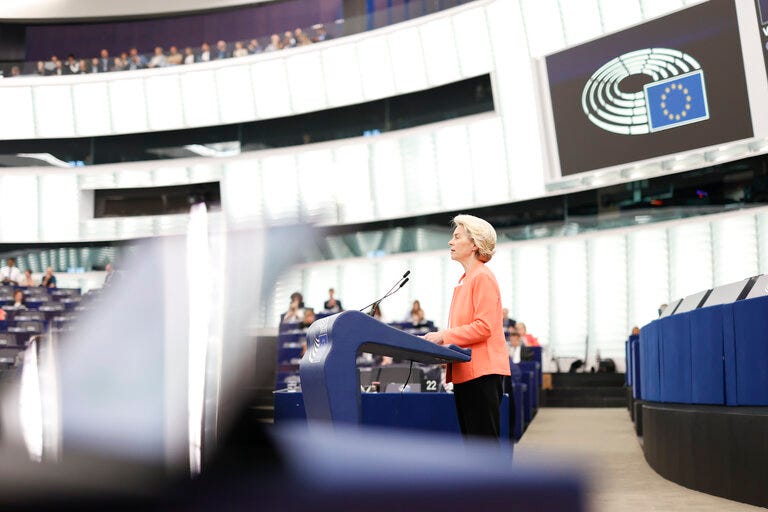EU Commission Seeks to 'Answer the Call of History'
Ursula von der Leyen delivers a business-friendly State of the European Union Speech in Strasbourg.

The State of the European Union is an annual address given by the President of the European Commission to the European Parliament plenary session every September.
This year’s address is the fourth and final address by Ursula von der Leyen in her current mandate as President of the European Commission, the executive branch of the EU.
The purpose of the State of the European Union address is to discuss with elected MEPs what the EU Commission has done over the past year, what it intends to do in the coming year, and its vision for the future. 1
This year's speech (delivered in English, German, and French) by Ursula von der Leyen, the President of the European Commission took place on the 13th of September 2023 at the European Parliament in Strasbourg, France. 2
European Parliament elections will take place next summer, in June 2024.
A new European Commission will also be appointed in 2024.
History has come calling again as the EU focuses on geopolitics, competitiveness, and enlargement.
Geopolitics and geoeconomics increasingly matter more in EU policymaking.
From equality to security, there are many pressing problems on the horizon that need to be addressed.
The EU’s future success is a function of how relevant it makes itself to voters, particularly younger voters.
Becoming more geopolitical and geoeconomic
Improving competitiveness
Working towards enlargement
Unscramble-O-Meter | How confident should Europeans be with the state of today’s European Union?
The President of the European Commission, Ursula von der Leyen, framed her hour-long State of the European Union address to the European Parliament in an important way this year. In another example of how the EU Commission is thinking more strategically about the longer term, she put immediate focus on a demographic that is often overlooked within the Brussels bubble. Right off the bat, she spoke about the newest generation of European voters now coming through, the millions of voters who will vote for the first time in European elections across the continent next summer. These Gen Z voters, the youngest of whom were born in 2008, will get to place their choice in the ballot box at a time when the European Union is set for significant transformation. This is important because how politically engaged this generation in particular becomes will increasingly impact the future shape of the EU in the coming years and decades.
The Boomer generation was once the future and the European Union’s forerunner, the EEC, proved to be the solution for this generation who grew up in the aftermath of a European continent ravaged by the Second World War. “They believed that Europe was the answer to the call of history” said President Von der Leyen of them at the European Parliament this week.
Throughout its history, the European project has at different times answered such a call. It has also proven itself to be the key solution in shifting the geopolitical landscape of Europe at the end of the Cold War. The EU was the immediate choice for Eastern European countries once the Soviet system collapsed and the Berlin Wall came down.
Today, the EU finds itself at another critical juncture. The ravages of war have once again returned to continental Europe, in Ukraine. History has come calling again for Europe’s most successful peace project. The EU and its allies today are helping Ukraine to better defend itself. Many countries in the EU’s Eastern neighbourhood such as Ukraine, Moldova, and Georgia do not see their future in Russia’s backyard. Instead, they are now looking West and dreaming of becoming equal members of an expanded European Union. With enlargement very much back on the agenda, the EU seems set to answer their call and that of its own historical purpose.
However, it is not just finding solutions to geopolitical problems that confront Europe’s next generation of voters next year. There are many other pressing problems. There is the existential threat of climate change. Equality is still a big issue in many parts of the Union. So too is finding a solution to better manage migration. One that is fair, humane, and to the satisfaction of EU voters. On the economic front, the European Union also has key challenges that its leaders need to address. In many member states there is right now a cost of living crisis driven by high inflation. Going to college, getting a good-paying job, or one day buying a house has become much more challenging for younger voters, particularly as interest rates in Europe continue to increase (up another 0.25% this month). For older generations, keeping their job, their house, finding affordable childcare, or securing a comfortable retirement are real issues likely to drive voting decisions, particularly as artificial intelligence looks set to disrupt many industries in the coming years, including the careers of white-collar middle-class workers who tend to vote.
Listening to Ursula von der Leyen’s State of the European Union speech this year, her fourth and final of this legislative mandate, it was clear that the EU Commission believes the best way to drive the EU forward over the next year is to become more geopolitical in its approach and business-friendly in its policy decision-making. The focus now is on improving economic competitiveness and working towards the significant enlargement of its membership, which also means significantly increasing the size of its internal market.







